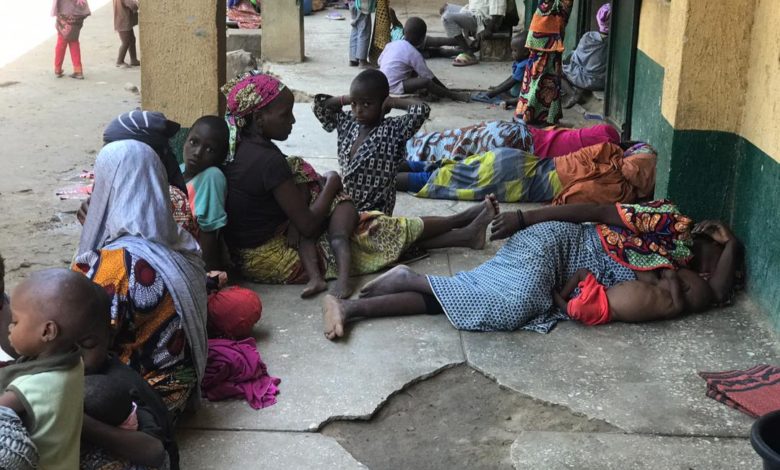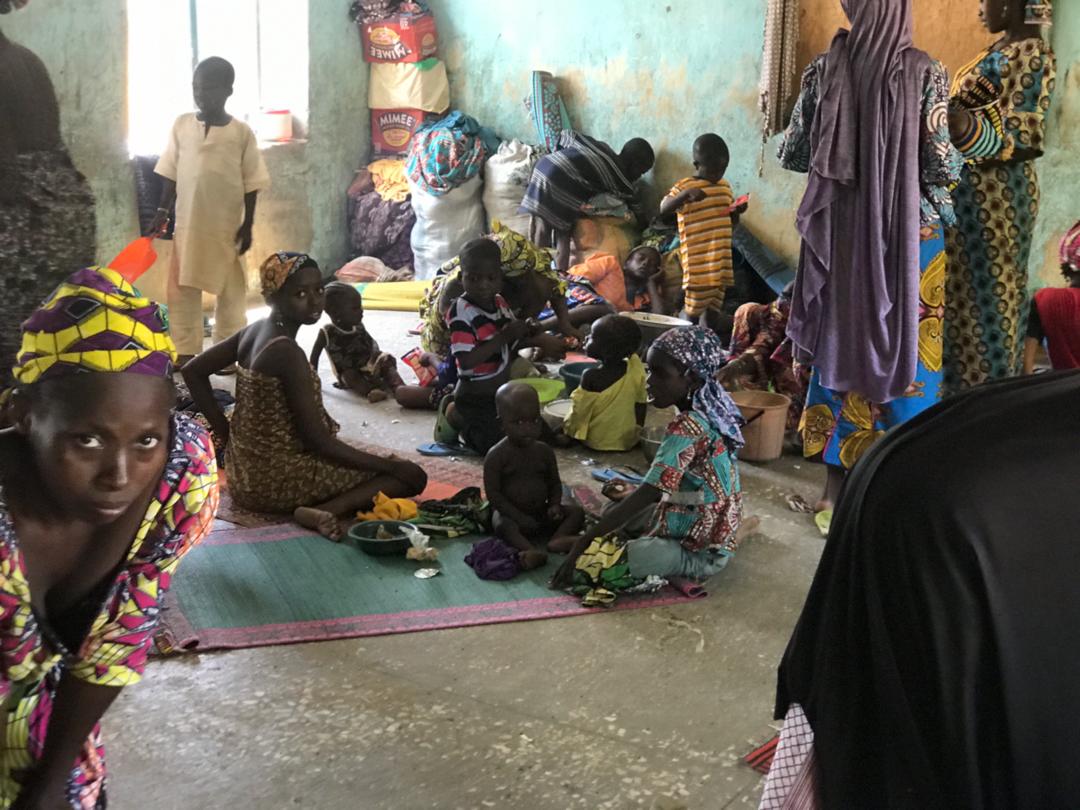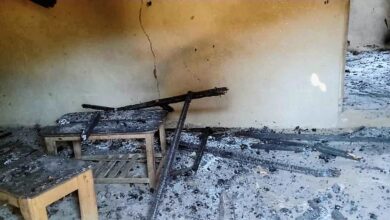20,000 IDPs In Katsina Living In Squalor

Terrorist attacks in communities of Faskari, Dandume, Batsari, Safana, Kankara, Sabuwa, Dan-musa, Matazu and Jibia local government areas of Katsina State have forced over 20,000 out of their homes to safer places within the state and nearby territories, HumAngle has learnt.
The attacks in the frontline local governments areas have resulted in the establishment of three Internally Displaced Persons (IDPs) camps at Batsari, Faskari and Dandume, where the people, mostly women and children, live in squalor, a HumAngle investigation has revealed. Thousands more are taking refuge with relations or in rented apartments outside their communities.
Sani Danmali, Katsina State Commissioner for Sports and Social Development and Chairman ,Committee on IDPs, said “ there were over 13,804 IDPs at the beginning but the number has dropped to 6,194 as many have gone home following the return of peace to their villages.”
There are four camps in Faskari Local Government Area where the people, predominantly farmers, stay. Faskari is on the boundary between Katsina and Zamfara states and among areas mostly affected by the attacks.
Kabiru Faskari, an aid worker with Red Cross, said: “We have four camps in Faskari, – Faskari Model Primary School, Shehu Inuwa`s House, Nurul-huda and Standard School.”
At Faskari Model Primary School, there are 5,621 inmates, consisting mostly of women and children in crowded classrooms as rain fell. The camp is located behind the district head’s house at the centre of town.
“This place houses 27 communities in Faskari, we are using 29 classrooms,” Sayyadi Hassan, a worker in the camp, said, adding: “Each classroom accommodates between 40 and 50 people, including children” who played around.
“There are 1,827 women, including over 300 widows and 3,794 children,” Faskari said.
He said “only women and children are living in this camp; their husbands are either living with people in the town or somewhere else. We don’t have the capacity to house all of them, most of them have more than one wife with at least 10 children.”
Around 2p.m., some men came to the camp gate with few inside camp talking to their women.
Barau Baba Ali from Kadisau has three wives and 21 children.
He said: “ They separated us with our family. The camp is too small to accommodate all of us. I was accommodated by one Islamic scholar in Yan Kara. I come everyday to see my family; we have spent over 47 days in this condition.”
Aisha Rabe of Bangi village said, “We have spent over 76 days here. They feed us three times daily but our major problem is (the absence of) toilets.” The camp has only four toilets for the over 5,000 population.
One camp steward said: “we cook six bags of rice and one of bag of beans everyday. Noodles, pap and tea are given in the morning while we normally serve “tuwo” (pudding) in the night.
“The government and NGOs provide clothes, foodstuff and other necessary materials used in the camp and we distribute among the IDPs.”
The camp is dirty with water flowing on the floor which made the environment smell badly.
“Water is a major challenge here. We wash the toilets every morning but they get bad soon after,” said Laure Isah, a camp worker.
“We need more places to accommodate people, the population is increasing on a daily basis and most of them are from extended families,” she said.
In Dandume Local Government Area, the camp is , at Dandume Model Primary School near the main market and hospital.
The Desk Officer, Sanusi Akimbo, said, “ we opened this temporary camp on 9th June, 2020 with over 7,500 people from 46 communities in Dandume, Sabuwa and Faskari local government areas.
“There is no camp in Sabuwa because most affected communities are closer to Dandume than their local government” area headquarters.
“The camp has less than 3,000 people. The governor came here last week and ordered us to release IDPs that are not from our local government area because biometric data will be captured in all local governments.
“Currently, we have 300 widows and over 500 orphans from all over the three local government areas here.”
They consume five bags of rice, one bag of beans and 40 cartoons of pasta daily and “ the food items are supplied by the state government; some philanthropists’ from the state also contribute,” Akimbo said.
Do they care about COVID-19?
Compliance with public health safety measures against the spread of COVID-19 are ignored as inmates neither use facemasks nor observe social distance and do not wash their hands in the camps.
The reporter saw one hand washing bowl in one camp but there was no water in it.
“ We distributed facemasks to them but they do not even believe the pandemic is real,” Faskari said.
“Social distancing in this condition will not be realistic. How do expect a classroom that accommodates 50 people in this rainy season to have such practice?” he asked.
“We try to see that IDPs inculcate the habit of regular washing of hands but they are not because the population is too high,” Faskari said.
“Precautionary measures against coronavirus pandemic are no longer considered here, though the pandemic is real, the people in such situation cannot believe it no matter how you try to educate them, they wouldn’t listen to you.
“Recently, army officers distributed facemasks as part of their celebration of Army Day but it is no longer used at all by IDPs,” he said.
New babies keep coming
Officials are worried about increased number of new babies being delivered in camp.
Faskari, who is in-charge of the camp clinic, said, “ Within one month, we recorded 42 new babies and there are more than 70 pregnant women.
“There is increase in birth rate, at least two to three put to bed on daily basis here but once we have the report of such, we do normally refer to them to Fskari Hospital.”
Basira Sani from Hurumin Kogo village in Faskari Model Primary School camp shared her experience with the bandits while she was in labour.
“ I kept running and crying alongside other women following an attack on our village.
“The bandits ran after us with vigour, I kept falling and rising without looking back. It was in this situation that labour set in; a little while later, I gave birth.
“ The baby girl was wrapped in a rag by fellow women and brought to my brother`s house in Faskari town where she was cleaned up and properly clothed. As for me, I arrived in the town without shoes or hijab.”
Basira continued “my son who used to take care of me died recently following the worsening leg injuries caused by a previous attack. I am pained; I lost two other young ones as well from different attacks.
“We are in pain, to eat is difficult, the food is available but the thought of what we left behind and what we are passing through keeps haunting us and forcing one to lose appetite.”
On further inquiry, HumAngle found that deliveries in the camp clinics are performed by traditional midwives and community health workers, while few are taken to primary health care centres.
Larai Kadisau said about the situation: “this banditry has destroyed our family setting and businesses.
“I have three brothers, I don’t know whether they are still alive or killed. I have done my best to find them but no one has given us any information.”
“We have up to 370 women, the majority of us here have no information where our husbands are. For some of us who have cell phones, when they call their husbands and tell them that they are here, they would ask them whether they have food and shelter. And if they answer them yes, they encourage them to continue to stay,” Indo Shuaibu said.
Recently, the district head of Batsari, Alhaji Muhammad Mu`uazu, said attacks on communities in the local government area, including the one on Yar Gamji in which 20 farmers died, had made 500 women widows and 1,600 children orphans.
New marriage
Meanwhile, in Batsari camp, a middle-aged woman, Ramma, who came to take refuge after an attack on her village, contracted a marriage.
“ I met Kabiru here and we got married on June 7 at the palace of the district head of Batsari,” Ramma said.
Food security threatened as farming is disrupted
The displaced populations are mostly farmers who left their villages in search of safety and abandoning their occupations.
In Kadisau Community, Babangida Mustapha, a maize farmer, said “ farming will not be possible this year. The bandits warned us before the rains that we should not attempt to farm if we want peace.
“Despite the presence of the military in Faskari, our people are afraid to go back to farm because the bandits can attack any time.”
Lawal Dandume, also a maize farmer, said “the group warned us not to go near our farms again and accused us of providing information about their activities and hideout to the military.”
Alhaji Umaru Damari, a mechanised rice farmer in Sabuwa Local Government Area, said: “honestly speaking, we are in trying moments.
“The security situations in Katsina and some neighboring states are in serious state of derogation. Farming which is the major preoccupation of people in these places has been paralysed.”
“Most villages within the eight most affected local government areas in Katsina State are under the control of bandits. They could storm a village and spend hours without any help from the security agencies, this has undermined the agricultural and socio-economic activities of the areas.
“The ahas already started, we are supposed to be in our farms now, and we do not know what will happen next year because most of our people are not going to their farms this year.
“Some people have left their communities and some relocated entirely from the country to Niger Republic,” Musa Ado from Yar Gamji said.
Support Our Journalism
There are millions of ordinary people affected by conflict in Africa whose stories are missing in the mainstream media. HumAngle is determined to tell those challenging and under-reported stories, hoping that the people impacted by these conflicts will find the safety and security they deserve.
To ensure that we continue to provide public service coverage, we have a small favour to ask you. We want you to be part of our journalistic endeavour by contributing a token to us.
Your donation will further promote a robust, free, and independent media.
Donate Here






